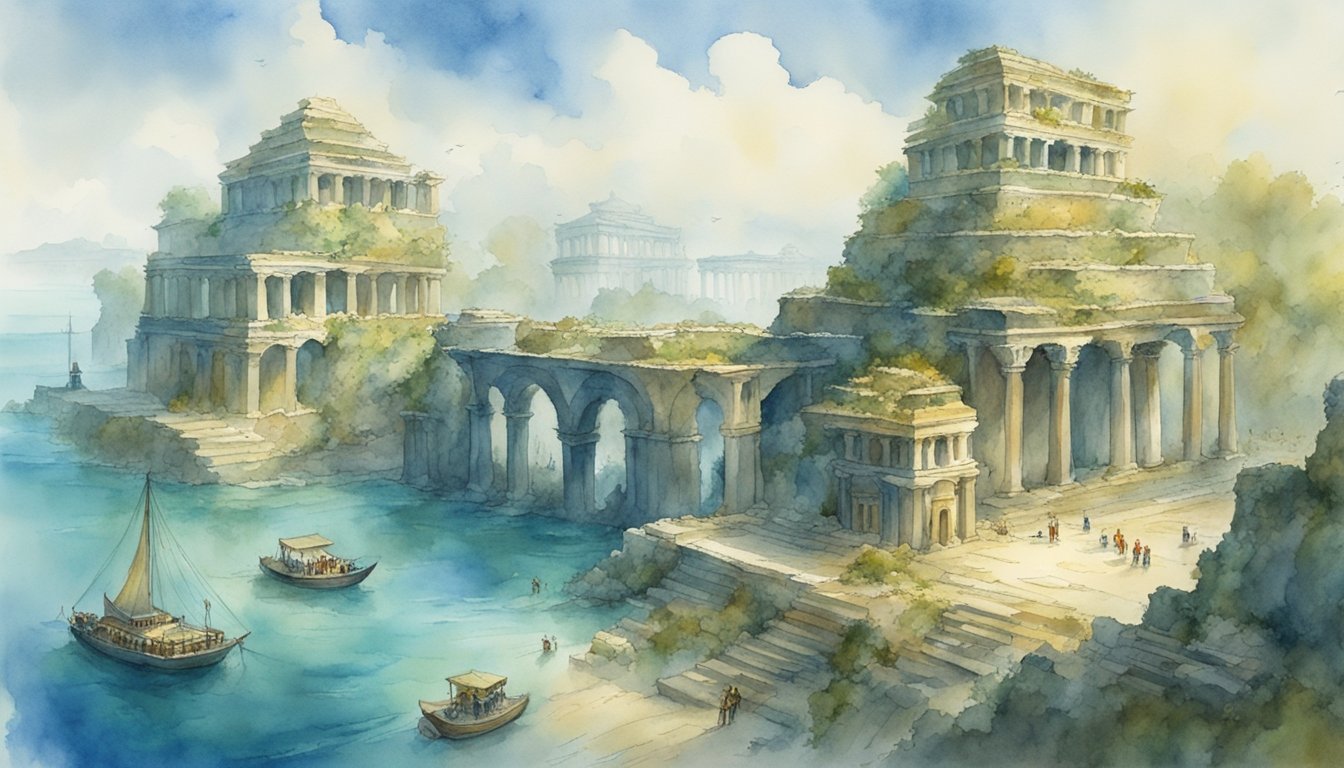The Myth of Atlantis
Literary Origins and Historical Impact
The myth of Atlantis can be traced back to the ancient Greek philosopher Plato, who wrote about the legendary island in his dialogues, Timaeus and Critias. These works have had a significant impact on storytelling and the concept of an ideal society throughout history.
Atlantis appears as a powerful and advanced civilization that suddenly disappeared. Such a captivating tale has influenced many thinkers and writers to theorize about the nature and location of the island. Though it is most likely a fable, the story continues to spark fascination and speculation among people over centuries.
Plato’s Description and Symbolism
In Timaeus and Critias, Plato describes Atlantis as an island larger than Asia Minor and Libya combined. It was said to be situated just beyond the Pillars of Hercules (modern-day Strait of Gibraltar) and inhabited by a morally and spiritually advanced people. However, the Atlanteans gradually became greedy and morally corrupt, leading to their downfall.
The myth of Atlantis serves as a metaphor for hubris, a warning against human pride. The legend is interwoven with aspects of the Ancient Greek culture, such as the god Poseidon, who was said to have been a patron of the island. The disappearance of Atlantis could be interpreted as a consequence of not living up to a perfect society.
Plato’s Republic discusses the concept of an ideal state, which has been compared to the myth of Atlantis. The inhabitants of this utopian civilization were wise and just, but fell victim to their own successes and weaknesses. The story of Atlantis serves as a cautionary tale, highlighting the importance of humility while striving for greatness.
By examining the myth of Atlantis, we can see how the story conveys the complexity of human nature and serves as a reminder of the eternal challenge to maintain moral and societal balance. While the existence of Atlantis may never be proven, the legend endures as a significant element in the realm of ancient storytelling, symbolism and myth.
Historical and Scientific Investigations

Search for a Real Location
The legend of Atlantis sparked curiosity and led to various investigations to find its real location. In the late 1800s, a congressman named Ignatius Donnelly wrote a book called “Atlantis: The Antediluvian World”, which inspired more in-depth investigations into the possible location of the lost civilization1. While some researchers believe that Atlantis lies beneath the waters of the Atlantic Ocean, others have explored alternative locations such as the island of Santorini in the Aegean Sea2.
The island of Santorini (also known as Thera) experienced a massive volcanic eruption around 1600 BCE, which caused a section of the island to sink3. This catastrophic event led some researchers to connect the Minoan civilization of Crete with the Atlantis story. In 1966, oceanographic engineer James Mavor discovered evidence of a Minoan city dating back to 1,400 BCE off the coast of Thera3.
The Atlantic Ocean has also attracted attention due to some convincing geological information4. Researchers speculate that the lost city was located near the Strait of Gibraltar and that the civilization was destroyed by earthquakes and tsunamis5.
Connections to Other Ancient Cultures
Apart from archaeological and geological investigations, researchers have studied ancient texts and historical records in an attempt to find connections between Atlantis and other ancient civilizations. For instance, the ancient Egyptian records contain references to Solon, an Athenian lawgiver, who mentioned a great island resembling Atlantis6.
The tale of Atlantis is notably present in the works of the ancient Greek philosopher, Plato, specifically in his dialogues, Timaeus and Critias7. The Greek connection has led some researchers to draw parallels between Atlantis and the Trojan War, a conflict that occurred between the city of Troy and the Greeks around 1250 BCE8. However, despite these attempts to connect Atlantis to other ancient cultures, definitive evidence proving its existence and location remains elusive.
Though studies on the lost island of Atlantis continue to intrigue scientists and historians worldwide, there is still much debate on its historical accuracy and philosophical significance9. By examining various textual, archaeological, and geological sources, researchers aim to uncover clues that may finally reveal the truth behind this fascinating enigma.
Footnotes
-
Donnelly, I. (1882). Atlantis: The Antediluvian World. New York. ↩
-
https://www.britannica.com/topic/Atlantis-legendary-island ↩
-
https://www.whoi.edu/news-insights/content/how-a-newly-established-oceanographic-institution-in-woods-hole-searched-for-the-lost-city-of-atlantis/ ↩ ↩2
-
https://www.bbc.co.uk/history/ancient/greeks/atlantis_01.shtml ↩
-
https://www.ancient-origins.net/myths-legends-europe/platos-atlantis-0017349 ↩
-
Plato. (c. 360 BCE). Timaeus and Critias. ↩
-
https://www.bbc.co.uk/history/ancient/greeks/trojan_war_01.shtml ↩
-
https://www.britannica.com/topic/Atlantis-legendary-island ↩

